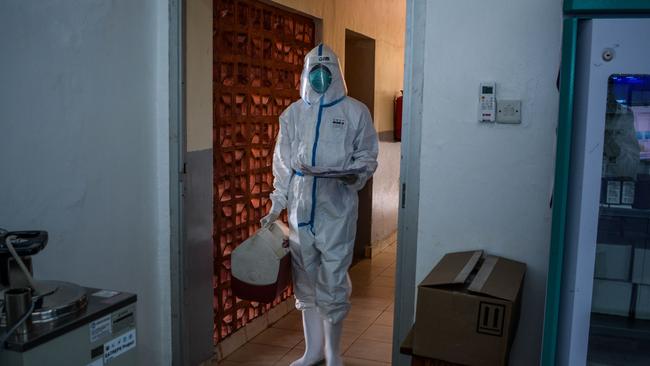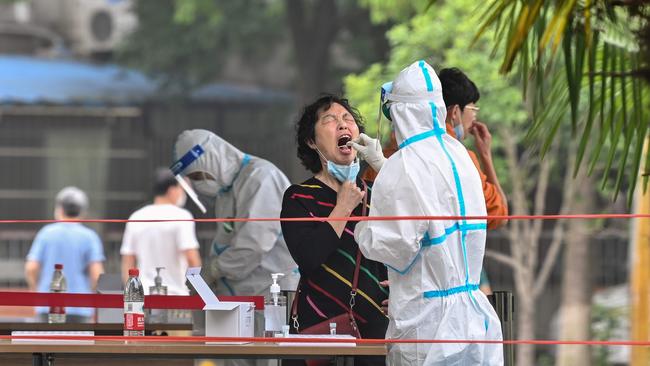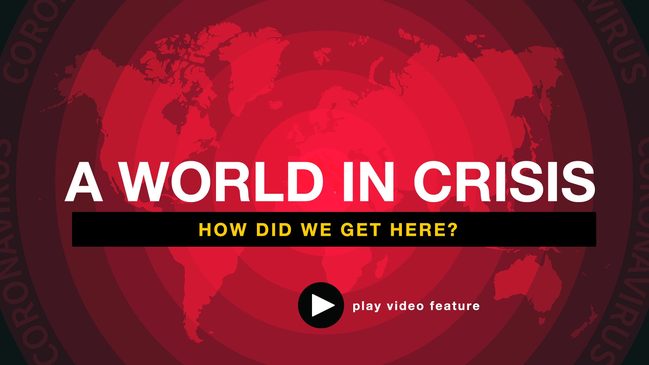Coronavirus and the great age of uncertainty
We’re still unsure what we’re going through or where we’re going.

If it is true that “Humankind cannot bear very much reality”, as TS Eliot wrote, it is more obviously the case that humankind cannot bear very much uncertainty.
As we now enter the middle stage of the pandemic, with little idea of how long this stage will last — three months, nine months or even two years — the burden of uncertainty has become the prevailing, and increasingly oppressive, condition, one everybody will have to learn to live with as best they can. The basic truth is that we still have little comprehension of this pandemic.
Uncertainty presses on multiple fronts. With the virus itself, very little is known — and despite an unprecedented global effort in medical research and demographic testing. It’s not even sure a vaccine will be found; how it will operate; or when it will be available. Timelines are speculative, constantly amended, little more than dotted doodles across the page of the future. Focus has switched to a “second wave” of infections, likely more acute than the initial wave, inducing new levels of communal anxiety. Mind, in the Australian case, the first wave manifested more in fear and shutdown than in high infection rates.
Uncertainty striated by anxiety has led to collective mood swings. The whole society’s emotional register has fluctuated as one, behaving precipitately like tightly reined hysteria, led by the media collaging eruptions of new medical opinion from around the world.

In March, there was horror at what was unfolding in Italy and apprehension about what might follow here; last month, optimism that the infection was under control in Australia, perhaps even beaten, and we would start to see the easing of restrictions; and now, recurring ambivalence and worry as the lockdown is tentatively eased. And, as people become tired and even resentful of restrictions, their compliance threatens to relax.
There is the uncertainty faced by businesses large and small, sports, cultural institutions and indeed almost everything that operates in the public sphere. The question of whether an enterprise should reopen, and on what scale, re-employing how many staff, is plagued with doubt, given chronic insecurity of demand in an economic environment where the “animal spirits” that feed confidence and buoyancy are stone cold. Compounding hesitancy is the new fear that a second wave will strike, forcing the country to close down again — expert opinion claims this to be likely. Open, close, open, close … there will be limited tolerance before businesses shut down irrevocably.
Uncertainty threatens the equanimity of both individual and society. The obsessional-neurotic character trait is common in mild forms, feeding anxiety whenever disorder threatens. Such a personality is compelled to clean, tidy, trim, plan, schedule, categorise and compulsively work — all to keep chaos at bay. And, in many areas, there are realistic long-term fears — think of the nervous exhaustion of doctors and nurses in COVID-19 wings in the major hospitals, staffing near-empty wards but not knowing when they might be deluged in critically ill patients, and for how many months, or even longer, they will need to be on high alert.

On the society-wide front, German sociologist Max Weber coined the term rationalisation to describe the determining logic of capitalist modernity: a principle according to which every major new change, from technological development to organisational innovation, seeks to make processes more rational, more predictable and less subject to risk — ranging from insurance to railway timetables and online hotel booking.
To rationalise is to reduce uncertainty. Making orderly and predictable is coded into the DNA of modern process, to the degree that it is quite unclear how traumatic the current state of despotic uncertainty will prove, how damaging to long-term confidence and morale.
In today’s new era, the quaking economic fundament will inevitably precipitate moves to project some predictability over the future course of events, even though the projections are largely fanciful. To adapt Eliot: Better an illusion of order than uncertainty.
Decisions
Within this volatile climate, weighty and important decisions have to be made. This is the lot of political leaders. Suddenly, as during wartime, politics has become serious. Real decisions need making, sometimes on the run, grave decisions with lives at stake and hundreds of thousands of livelihoods in the balance. Public servants no longer run the country; bureaucracy has been sidelined.
Politics has become a vocation once again, ruled by an ethic of responsibility, whereby options need to be carefully calibrated against alternatives, probabilities assessed, decisions made even though the outcome is unclear, and responsibility taken for the result, whatever it may happen to be. “Uneasy lies the head that wears a crown.” Politics has been lifted above the banal everyday swamp of networking for influence, career opportunism and public relations.
Whether to reopen schools is but one example of the extraordinary difficulty confronting premiers and the Prime Minister. Majority health advice has been that it is safe so to do as long as teachers and parents practise social distancing. Yet many teachers are understandably worried — the job they signed on to, unlike that of doctors and nurses, did not call for them to take such health risks. That schools are perfectly safe is hard to believe, given the lack of knowledge about the virus — and, practising hygiene with young children is near to impossible.
One of few political follies of recent months has been that of federal Education Minister Dan Tehan berating Premier Daniel Andrews for delaying the reopening of Victorian schools. Given the gravity of what is at stake, the caution of a premier who is clearly taking his job with weighty and troubled seriousness did not merit such a rebuke.
The political landscape has been marked by a second novel feature: the role played by chief medical officers. Medical science’s normal high prestige in its own narrow domain is now widely expanded to take central social stage, infused with political authority. A new duopoly of political decision-making has emerged. Scott Morrison and Brendan Murphy lead the country. The British response to the virus was damaged at the critical moment by political leaders acting on poor medical advice.
Cosmic irony
Standing back to take a longer-term view, a cultural revolution has occurred, forced by necessity in the form of a lethal plague. Since Jean-Jacques Rousseau, the West has swung through cycles: at one extreme celebrating nature and vilifying civilisation; at the other embracing civilisation, for example during the Victorian era. The high dependency on medical science has, on the instant, taken control of the cultural pendulum and put civilisation back on top.
Rousseau penned the oracular line, in his Social Contract of 1762: “Man was born free, and is everywhere in chains.” Rousseau reversed original sin. He established the categories that would recur across the next 2½ centuries.
It is civilisation that has hobbled humans, developing in them artifices, pretensions, hypocrisies, and bringing the curse of guilt and unhappiness on their condition. Rousseau elaborated with his notion of the innately virtuous and happy “noble savage”, the original human living in the state of nature. Before civilisation, humans were innocent, creative and good — like children. Rousseau founds the belief that it is Western civilisation that is evil, not some inborn human depravity.
Since the 1960s, Rousseau has been in the ascendancy once again in the West. The nature-glorifying upswing has been illustrated in recent years by green politics, apocalyptic climate activism, anti-capitalist rhetoric, hatred of the US and, more recently, identity politics — in the state of nature, it is bizarrely held, a person is free to choose their identity.
But now, the gale of reality unleashed by the pandemic has blasted every one of these political causes into irrelevancy, reduced them to no more than a string of soap bubbles popping back to airy nothing.
In a kind of cosmic irony, an era of green ideological ascendancy has been slapped in the face by its own god — Nature — in the form of a virus, an unambiguously malignant nature asserting that its savagery has no noble qualities. Blown-up microscopic images of the coronavirus — a lurid iridescent sphere with spikes — make it look like some malevolent sci-fi alien invading from outer space.
Further, the puny insignificance of humans in the face of nature has been demonstrated once again. Nature might be imagined as some kind of vengeful almighty God, like the Yahweh of the Jewish Bible responding to Job, scoffing at his protest about divine injustice: “Where were you when I laid the foundations of the Earth!” Job is put in his humble place; he is taught respect. Such hubris it is for humans to assume they have significant influence over climate, for better or for worse!
The same cosmic irony, or fate, may also be read backwards on to the summer of extreme bushfires in eastern Australia. Here was an anticipatory lesson about the power of nature, one that Australians, of all people, should need no reminding about.
Yet civilisation does fight back. Our political leaders strive to manage the whirlwind. In these portentous times, we should hold them and their task in awed esteem. Our medical researchers strive to find a vaccine. Our health officers strive to use what spotty knowledge they have, knowledge that varies by the week, to give practical advice on rules for citizen behaviour. And everyone else tries to adapt.
Adaptability
How will countries come out of this? Is it too early to speculate? Let me take my cue from the term creative destruction, coined by Joseph Schumpeter to describe the defining mechanism of the modern capitalist economy.
There has already been great destruction, with more to follow. Some of the upheaval is likely to have permanent effect. City offices have been emptied, with staff working from home or retrenched; it is hard to imagine that the “office”, and the 9-to-5 Monday-to-Friday week will ever return to what it was. We may be on the cusp of an epochal shift in the history of capitalism into a third phase, in terms of the predominant place where work is based: from the factory, to the corporate office, and now to some hybrid incorporating the hi-tech home.
Likewise, the suburban shopping street focused on retail is unlikely to fully recover from the present sad and grim reality of lines of vacant shops to lease. The trend to spending more and more of life online — work, leisure, entertainment and shopping — has been radically augmented by virus lockdown and in the post-virus world may not be significantly wound back.
In terms of “creative”, adaptability will prove the key to the speed and extent of the spring back from the recession, or worse, induced by the virus. Adaptability will largely depend on entrepreneurial flair, sizing up a very different economic landscape, with old avenues closed down, and imagining new opportunity. How well or badly countries come out of the pandemic will be determined largely by their adaptability. One encouraging sign in the Australian case has been rocketing entrepreneurship in the past decade among the under-35s, reflected in registration of business names, start-ups and new business accounts.
Another sign of adroit adaptation was the political innovation of a national cabinet; and the responsiveness of medical officers and senior staff in hospitals to rapidly adjust to the potential crises racing towards them. That the heads of intensive care units in major hospitals have had open phone contact with the Chief Medical Officer, who speaks directly to the federal Health Minister, has meant a fast and efficient direct chain of command and information flow, up and down, unimpeded by bureaucracy.
Silver linings
Other positives emerging from the pandemic reality check can only help recovery. Civilisation is once again valued for the extraordinary benefits it has brought — who in their right mind would choose to live in pre-modern Europe, in its state of nature characterised by recurring plagues, endemic squalor, crushing poverty and brute struggle for survival? Also, a rightful relationship to nature may be restored, a balanced one free from hysteria and delusion, founded on respect. Further, the nation-state is, we are being forcefully reminded, the most practical large-scale organisational social unit, and it is the one to which people feel bound with attachment and loyalty. Bureaucratically bloated and ineffectual supranational bodies such as the EU and the UN are exposed as superfluous. Minor benefits may be added, like the erasing of cultural fads such as identity politics and climate, at least for the moment. Although Donald Trump has struggled under the spotlight of the real need for US political leadership.
From today’s perspective, there are two ultimate uncertainties shrouding the pandemic, one on each of the fronts that have most preoccupied political leaders — human lives and the economy. We have no idea of how many lives are going to be lost: the statistical prediction curves we see in the news each morning are worthless.
Further, there is no guarantee countries, including Australia, will fully recover; they may rather limp slowly onwards in a permanently damaged condition. Alan Kohler, writing in The Australian, put the current American unemployment rate already at near 30 per cent — Great Depression level. As a sobering reminder here in Australia, the depression and drought of the 1890s was followed by 50 years of near economic stagnation. Yes, unlikely to be repeated, but we just don’t know.
John Carroll is professor emeritus of sociology at La Trobe University.
